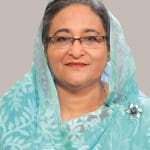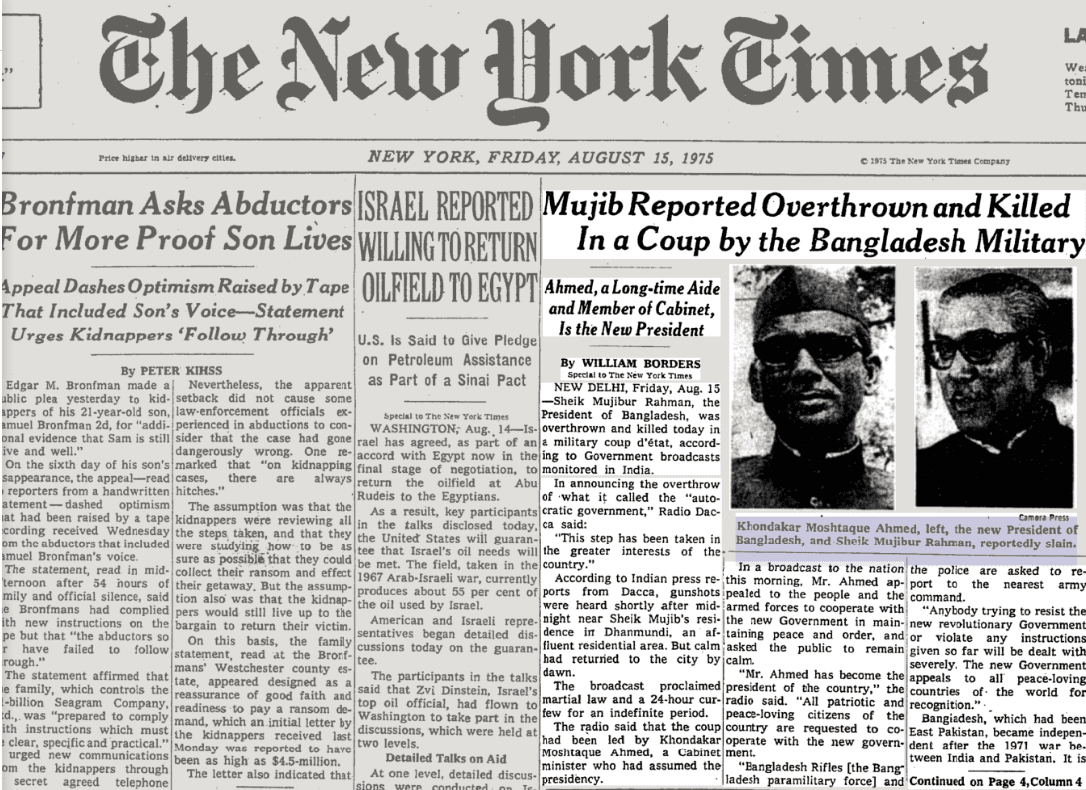Rashed Chowdury is one of the twelve assassins convicted by the highest court of Bangladesh for the massacre of August 15, 1975, i.e. the murder of Bangladesh’s founding father Sheikh Mujibur Rahman and sixteen of his family members. The trial was completed 14 years ago. However, justice remains unfulfilled as till date, only twelve of the convicted assassins had their sentences carried out, while five, including Rashed Chowdhury, remain at large.
The Events of August 15, 1975
At the risk of over-simplification, the following transpired on the early hours of 15 August, 1975: A group of derailed army officials and soldiers, as part of a coup-de-etat with national and international support, killed the Father of the Nation and erstwhile President Sheikh Mujibur Rahman, and sixteen of his family members. Justice would remain a far cry, as the conspirators and their backers indemnified the killers. In fact, successive governments of General Ziaur Rahman, General H M Ershad, and Khaleda Zia, not only continued the indemnity, but also rehabilitated the killers with overseas employment, funding, and political empowerment.
Long Road to Justice
It was only after one of Sheikh Mujibur Rahman’s two surviving daughters, Sheikh Hasina, led Awami League to its first election victory after two decades that the process of justice could be activated. By repealing the Indemnity Act in parliament, Sheikh Hasina’s government removed the legal obstacle to holding the trial. As for the trial itself, Sheikh Hasina, rather than opt for the easy way of trying the killers through a special court or tribunal, decided to pursue the conventional justice mechanism. On October 2, 1996, the first information report (FIR) was lodged. After two years of rigorous legal proceedings, on November 8, 1998, Judge Kazi Golam Rasul handed down death penalties to 15 accused (and acquitting four others).
Politics Delayed Appeals
Despite the verdict of the lower court, the appellate stages of the proceedings would take years to conclude. First several High Court judges and then Appellate Division judges felt embarrassed and preferred to refrain from holding the trial at that time. The High Court appeal finally started on June 28, 2000, about 20 months after the verdict of the trial court, and completed on April 30, 2001 after the judgment of third judge. However, the case was not heard for a single day during the BNP-Jamaat Government’s five-year tenure (2001-2006) because of a “lack of judges” in the Appellate Division. The then government was severely criticised for not making provisions for ad-hoc judges to hear the final appeal. Again, it was only after Sheikh Hasina once again became Prime Minister in December 2008, that the final appeals could be heard. The final appeal hearing of the case began at the Appellate Division on October 5, 2009. The Appellate Division upheld the death penalty for the 12 convicts in their verdict on November 12, 2009.
Convicts & Fugitives
Syed Farooque Rahman, Mohiuddin Ahmad, Bazlul Huda, AKM Mohiuddin Ahmad, Sultan Shahriar Rashid Khan were executed on January 27, 2010, and Captain Abdul Majed’s execution was carried out at Dhaka Central Jail in Keraniganj on April 11, 2020. Another condemned killer, Aziz Pasha, who sought refuge in Zimbabwe, met a natural death in June 2001. The other five killers who are on the run and sought refuge in other countries are sacked Lt Col Khandaker Abdur Rashid, SHBM Noor Chowdhury, Shariful Haque Dalim, Rashed Chowdhury, and Risaldar Moslehuddin; there are in different parts of the world.
These fugitives are absconding from justice by living and hiding abroad. The whereabouts of some fugitives are known to the general public. Rashed Chowdhury, who lives in the U.S. state of California, is one of the absconding fugitives. Other fugitives include the notorious coup leader Khandaker Abdur Rashid, whose whereabouts remain unknown. Rashid gave a TV interview in 2007, which was widely reported. The interviewer was the Channel-i talk show host Zillur Rahman, who now runs the Center for Governance Studies (CGS). The fugitive Nur Chowdhury continues to reside in Canada, with his deportation being subjected to bilateral discussions between Bangladesh and Canada. In 2007, one of the absconding killers, A K M Mohiuddin, was successfully deported from the United States to Bangladesh to face his sentence.
Case of Rashed Chowdhury
Rashed Chowdhury received political asylum in the U.S. in 2004 after an immigration court gave undue weight to his version of the events of 15 August 1975. A judge gave “full evidentiary weight” to Rashed’s claim that he was “a last-minute inductee who played a relatively minor role” in the assassination. It appears the judge reached this conclusion because the opposing side presented a weak case. In 2006, the Board of Immigration Appeals upheld the order of the judge. However, the courts of Bangladesh found Rashed to be one of the key persons involved in the assassinations of 15 August, 1975. Rashed was one of the “actual shooters” involved in the assassination, along with A. K. M. Mohiuddin Ahmed. Mohiuddin was deported in 2007 after US courts decided that he should face the death penalty in Bangladesh.
The situation is a paradox because of contradictory decisions by US courts. In the case of Mohiuddin, US judges decided to send him back to Bangladesh; but in the case of Rashed, US judges have decided to grant him asylum despite both individuals being convicted in the same case on the basis of robust, thorough, and strong evidence which was prosecuted during a profoundly historic trial.
US Citizenship and Immigration Services (USCIS) has the power to terminate political asylum. US asylum law has several conditions when granting political asylum. The asylum seeker must not be involved in the persecution of people on grounds of race, religion, nationality, social identity or political opinion; must not be convicted of a serious crime; and must not have committed or be culpable of a serious “nonpolitical” crime outside the United States. Rashed’s case clearly fails to meet these conditions. But his asylum request was given approval in a seriously flawed judgment. There is a preponderance of evidence against Rashed. There is overwhelming evidence which proves his guilt in the assassination of Bangabandhu.
In 2020, Rashed’s case was reopened by US attorney general Bill Bar during the fag end of the Trump administration. A biased commentary on Politico in favor of Rashed denounced this move to reopen the case. The Politico article gave more weight to Rashed’s feeble claims that he was innocent. From the standpoint of Bangladesh, the article was promoting the obstruction of justice. Despite reopening the case, the matter did not proceed further. Its status under the Biden administration remains unclear. The government of Bangladesh has repeatedly called on the US to deport Rashed. No wonder, Prime Minister Sheikh Hasina recently expressed her frustrations on the topic thus:

Extradition and Deportion
US law allows the deportation of an individual if political asylum is canceled. The other avenue to bring back Rashed Chowdhury would be extradition. The US and Bangladesh currently do not have an extradition treaty, despite negotiations going as far back as 2001 to sign a treaty. The US constitution recognizes the importance of extradition domestically. In Bangladesh, a statute known as the Extradition Act, 1974 recognizes the importance of extraditing criminals. Murder is an extradition offence recognized under both Bangladeshi and US law.
Rashed is a murderer who is evading justice. It behooves the US to extradite this convicted murderer from America’s jurisdiction to Bangladesh’s jurisdiction in order to bring justice in a deeply important case. This case carries immense moral and historical ramifications. This can be achieved with or without an extradition treaty, as the case of Mohiuddin proved. Both Bangladesh and the US have extradition treaties with many countries, but the two nations are yet to conclude a bilateral extradition treaty. Both countries must reach a consensus on concluding a treaty to transfer criminals and terrorists between jurisdictions.
Bringing back the killers of Bangabandhu is a national responsibility. It lies at the core of our nation’s conscience. The US promotes the rule of law across the world. Nothing can be more important to the rule of law in Bangladesh than to bring back the fugitive killers of Bangabandhu Sheikh Mujibur Rahman, the man who led the freedom struggle of the nation and founded our republic.
About the Authors

Shah Ali Farhad is the founder and publisher of the Confluence. He is a lawyer, policy-researcher, and political activist. He is currently engaged with the Dhaka-based think-tank, the Centre for Research and Information (CRI), as its Senior Associate. He is an advocate of the Supreme Court of Bangladesh and a Barrister of the Lincoln’s Inn, UK. He previously served as a Special Assistant to the Prime Minister of Bangladesh. He holds a masters of public policy (MPP) from the University of Oxford, and a masters in human rights law (LLM) from the University of Hong Kong.

Umran Chowdhury is a legal practitioner and analyst working at a law firm in Dhaka, Bangladesh. He previously worked in a global law firm and was a research assistant at a law school under the University of London. He also worked at the Bangladesh Institute of Law and International Affairs (BILIA)
